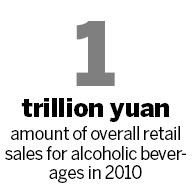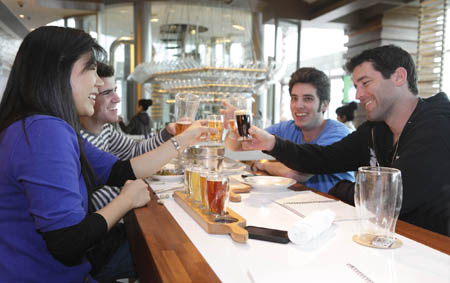Economy
Liquor makers urged to keep prices stable
By Lan Lan (China Daily)
Updated: 2011-04-09 10:39
 |
Large Medium Small |
BEIJING - Chinese lovers of beer and white liquor are unlikely to see more sudden price rises during the coming months after the recent waves of hikes that swept the country's alcohol market, said industry insiders.
China's most prestigious white liquor producer, Kweichow Moutai Co Ltd, raised its prices by about 20 percent earlier this year. Meanwhile, a host of liquor makers have lifted their prices by about 10 percent in the last few weeks. Moreover, brewers such as Tsingtao Brewery Company Limited and Beijing Yanjing Beer Group Corporation have also raised the price of their beers by around 10 percent.
|
People cheer at a bar in Shanghai. Imports of wine increased by about 60 percent in 2010, said Liu Yuan, secretary-general of the China National Association for Liquor and Spirits Circulation. [Photo/China Daily]? |
Liquor manufactures always choose a slack sales season such as spring to raise prices, giving the market a few months to absorb the price changes, he said.
Overall retail sales for alcoholic beverages stood at nearly 1 trillion yuan ($1.5 billion) in 2010, meaning that they comprise the largest production group in the country's food-processing industry, and price fluctuations have a direct impact on inflation expectations, Lin said.
Policymakers are trying to gain more knowledge about the industry and hope that the companies will maintain relatively stable prices, given the rising inflationary pressures caused by both internal and external factors, Liu said.
The government won't use administrative measures to interfere with pricing, except in extreme conditions, but most companies will commit to their responsibility to keep prices stable, he said.
A stable market is vital for beverage companies, Liu added.

Xing Zhijian, a food analyst at Qilu Securities, said rising production costs make it reasonable for brewers to raise prices.
The price of imported barley - which accounts for about 20 percent of the overall production cost of beer - increased by about 50 percent in March, compared with the same month last year.
Other costs, including bottles and packaging, have also risen rapidly, said Xing.
However, he said increases in the price of white liquor, were mainly spurred by robust market demand and the "ripple effects" of Moutai's price hike in January, which allowed competitors to raise their prices and gain market share.
"Once prices have been raised, they won't be lowered again, because the profits have already been spent," Xing said.
Liu of China's Alcohol Association said the rise in the price of domestic liquors will enable imported wines and liquors to gain a greater market share.
The import volume of wines increased by about 60 percent and the value rose by around 70 percent in 2010, he said.
| 分享按鈕 |




